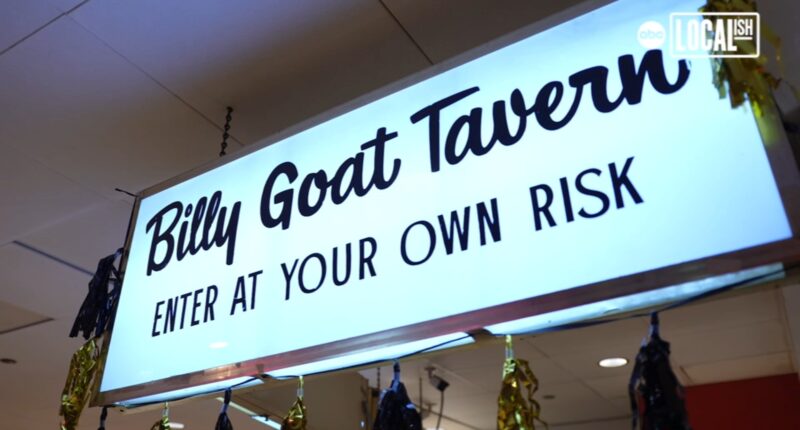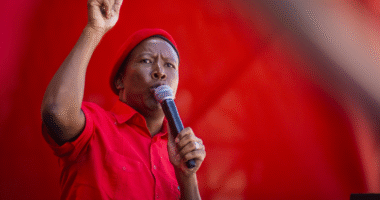Chicago — In Chicago, when you descend the stairs off Michigan Avenue close to the Wrigley Building, you leave behind the fancy shops of the Magnificent Mile and enter one of the city’s famous taverns.
Inside, the walls are covered in history, and as soon as you walk in, you can smell the distinctive scent of sizzling beef on a flat grill. This is the Billy Goat Tavern, an underground haven that is marking two significant milestones in 2024-25.
Ninety years back, in 1934, Billy Goat’s welcomed customers in a small tavern close to the old Chicago Stadium. Sixty years ago, in 1964, this renowned location on lower Michigan Avenue opened, solidifying its spot in the city’s history. This twin anniversary celebrates more than just a bar or a burger joint; it represents a time capsule, a hub for journalists, a reference point in pop culture, and a lasting symbol of Chicago’s genuine spirit.
Bill Sianis is the third generation of his family to run “The Goat”.
“In 1934, my great uncle (William ‘Billy Goat’ Sianis) was an immigrant from Greece who got a chance to buy a bar,” Sianis said. ” So across the street from the old Chicago Stadium, there used to be a bar called Lincoln Tavern, and they bought that bar.”
Fate intervened shortly after. “He heard a noise outside the door, went outside and saw it was a goat outside the door,” Sianis continues. Rather than shooing it away, William Sianis embraced the absurdity. “He decided to keep it as a mascot and renamed the place Billy Goat.”
Fast forward to the post-war era. “My father, Sam Sianis, came from Greece in 1955 and started working here with my great uncle,” Bill Sianis says.
It was Sam who spearheaded the move to the Lower Michigan Avenue location that would become its most famous. “[He] opened this place in ’64,” Sianis said.
Sixty years on, that spot at 430 N. Michigan Ave. remains remarkably unchanged, a deliberate choice that contributes to its enduring charm. It’s a living museum, its narrative told by the layers of memorabilia papering every available surface.
“The walls do the talking for this place,” notes Bill Sianis. “So you walk around and you see all these different pictures of the politicians, to the gold fixtures, to celebrities, to journalists. It’s been like this since 1964.”
And then there’s the food. Forget fancy gastronomy; the Billy Goat is built on the humble, satisfying foundation of the cheeseburger – or rather, the “Cheezborger.” It’s a simple formula, executed with decades of practice.
“The burgers that we have here are fresh, pure beef, no fillers or anything,” Sianis emphasizes. “We’re known for the cheeseburgers. Our menu is known for the cheeseburgers.”
The preparation is key. “Pure beef, no fillers, fresh,” Sianis said. “The other thing is that they wanted to do a thinner patty, so it cooks faster. It’s seared on both sides, but the inside is still juicy. So you could stack the burgers double… four patties and you still get a good burger.”
That efficiency, combined with Sam Sianis’ distinctive Greek accent and rapid-fire order calling, inadvertently launched the Billy Goat into national comedic fame.
“‘Saturday Night Live’s’ Don Novello, who was Father Guido Sarducci (on the 1975-80 iteration of ‘SNL’), before he was on TV, he was in advertising here in Chicago,” Bill Sianis recounts. “Don used to come here for lunch. My dad would be the one who would be yelling out the orders. And he would yell ‘Cheeseburger. Cheeseburger, Cheeseburger!'”
The experience stuck with Novello. “When ‘Saturday Night Live’ started in 1975, Don Novello wrote the ‘Cheezborger’ skit that everyone knows,” Sianis says, referencing the iconic sketch featuring John Belushi, Dan Aykroyd, Bill Murray, and Novello himself as disgruntled Greek diner countermen at the “Olympia Café”, perpetually shouting “Cheezborger! Cheezborger! No fries, cheeps! No Coke, Pepsi!” The skit immortalized the tavern’s vernacular and gruff charm.
The SNL connection brought a wave of new attention and famous faces. “We’ve had ‘Saturday Night Live’ past and present cast members visit, because of the skit,” Sianis mentions.
But celebrities were just part of the eclectic mix. “Then we’ve had different politicians from local mayors and governors to presidents like President Bush, Hillary Clinton,” Sianis said.
Yet, perhaps more than politicians or comedians, the Billy Goat became synonymous with Chicago journalism. Its location, nestled strategically between the Chicago Tribune’s gothic tower on Michigan Avenue and the Chicago Sun-Times’ then-home on Wabash Avenue (where the Trump Tower now stands), made it the perfect demilitarized zone for the city’s ink-stained wretches.
Richard Roeper, who recently left the Chicago Sun-Times after a 37-year tenure as a columnist and movie critic, remembers those days vividly.
“At the time, when I was coming up in the early and mid-eighties, the Chicago Sun-Times was on Wabash Avenue. Chicago Tribune was Tribune Tower, of course,” Roeper recalls. “And The Billy Goat was really kind of like the neutral zone between the two warring papers. The place would be jam-packed, especially on Friday nights with court reporters, sports reporters, investigative journalists, columnists”
The tavern honors this legacy through a unique tradition: select journalists’ bylines are framed and mounted on the already crowded walls, a quiet nod to their contributions and their patronage. Getting your name enshrined is an unofficial, yet deeply meaningful mark of belonging for Chicago reporters. Roeper is one of the chosen few.
“You don’t campaign for it. That would be a big mistake,” Roeper said about the honor. “You don’t ask for it and they don’t tell you about it. You just come in one day and someone says, ‘Hey, your name is up there’.”
For Roeper, the honor held a special significance. “And it’s a particular point of pride for me because my name is next to Roger Ebert, the legendary Pulitzer Prize-winning film critic for the Sun-Times. And of course, I became his television partner (on ‘Ebert and Roeper At The Movies’). And Roger, when he came up from Champaign Urbana, used to hang out at the Billy Goat way back in the day.”
The tavern is also a part of sports legend – the so-called “Billy Goat Curse”, tied to the long championship drought of the Chicago Cubs.
It began during the 1945 World Series between the Cubs and Detroit Tigers, when William “Billy Goat” Sianis, a Greek immigrant and owner of the Billy Goat Tavern, bought two tickets to Game 4-one for himself and one for his pet goat. Though Sianis and the goat were initially allowed in, Cubs owner Phil Wrigley allegedly told stadium ushers at Wrigley Field to eject the pair, due to the goat’s odor.
Following the incident, the Cubs lost the 1945 World Series to the Detroit Tigers and failed to make another World Series appearance for 71 years. “Billy Goat” Sianis, in jest, said that there was a curse on the team, due to his goat not being allowed to enter Wrigley Field.
“Reporters would come in and ask ‘Did you put a curse on the team?” Sianis said. “He told them ‘As long as they don’t let my goat in, they’ll never win the World Series’.”
Over the decades, fans came to view the curse as a symbol of the Cubs’ chronic misfortunes, with attempts made to lift it-including bringing random goats to Wrigley Field. The so-called curse finally ended in 2016, when the Cubs triumphed over the Cleveland Indians in a dramatic seven-game series to win their first World Series title in 108 years, effectively breaking the spell of “Billy Goat” Sianis.
“It wasn’t really a curse, but it seemed like a curse because the Cubs were always losing,” Sianis said.
Through decades of changing cityscapes, media landscapes, and culinary trends, the Billy Goat has endured. Part of its resilience comes from staying true to its roots and its regulars.
“We try to keep the prices reasonable because we get a lot of everyday workers here and we want to keep them affordable,” says Bill Sianis.
But more than the burgers and the beer, , it’s the continuity, the sense that time moves a little differently down those stairs, that keeps people coming back. “The thing that keeps this place going is that the memories of the customers stay here,” Sianis reflects. “You might have met your wife here. The memory stays here because it’s the same way that it’s been since the sixties.”
Ninety years since a goat wandered up to a tavern near Chicago Stadium, and sixty years since Sam Sianis opened the doors beneath Michigan Avenue, the Billy Goat Tavern remains fundamentally itself – loud, unpolished, and undeniably authentic.
It’s a testament to a simple formula: good, fast burgers, cold drinks, and a space where stories aren’t just told, they’re embedded in the very walls.
“You don’t last this long in Chicago unless you’re really good at what you do,” Roeper said. “I can’t imagine a Chicago without the Billy Goat.”
Copyright © 2025 WLS-TV. All Rights Reserved.

















